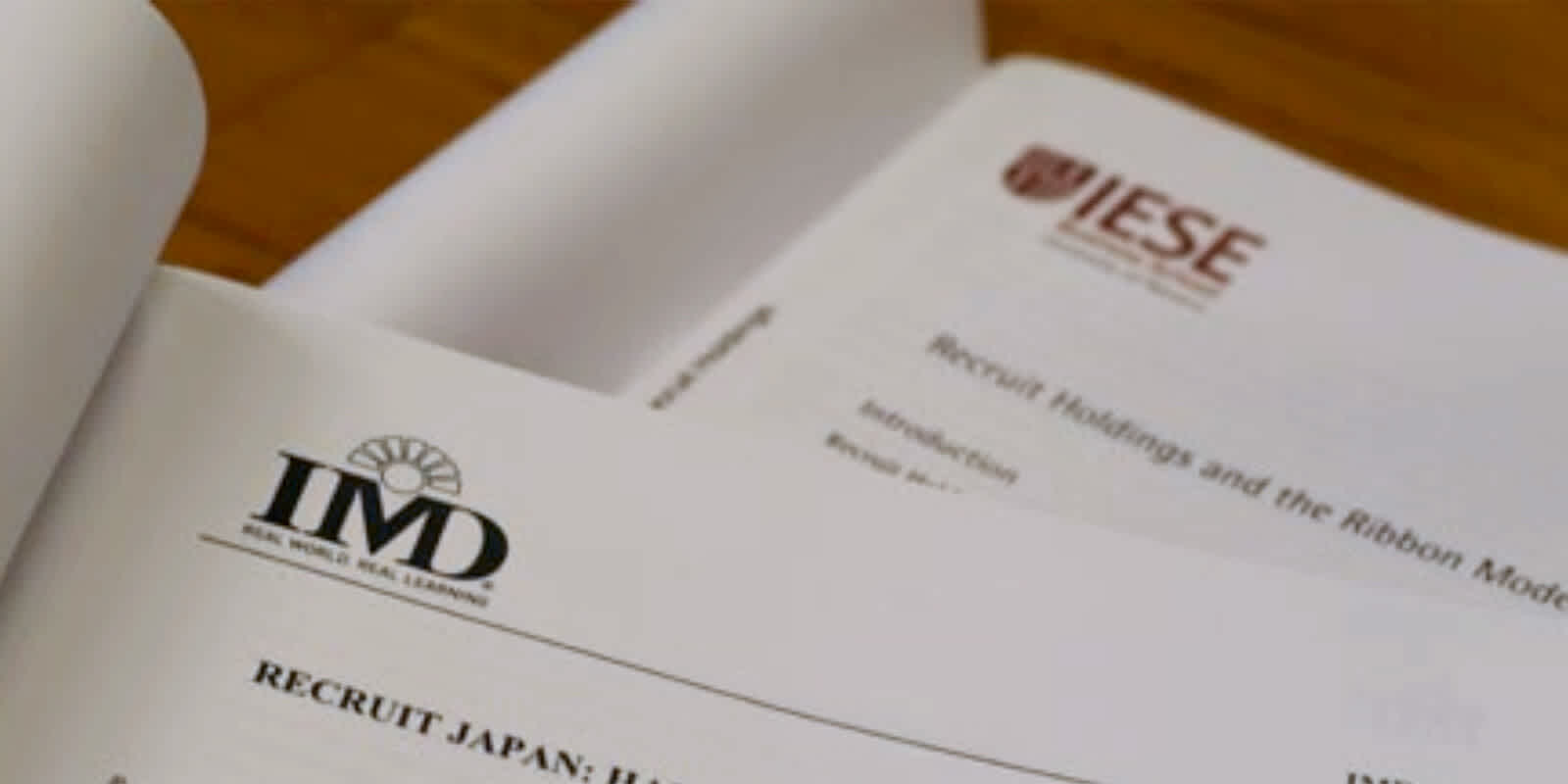The Ribbon Model is driving on Interaction with Customers outside Recruit and Cooperation of Individuals inside Recruit
Recruit's strength is its intellectual capital, which powers the high performance and deep insights of its human capital, and forges strong relationships with customers through countless interactions. Recruit has never stopped working to enhance its core competencies.
We call our business model the Ribbon Model. All of Recruit's core competencies are rooted in this Ribbon Model.
The concept behind the Ribbon Model is connecting users with clients. The first step is to gain insight into how they feel (i.e., do they have any dissatisfaction, inconveniences, or concerns) through interacting with customers. The next step is to enhance cooperation inside the companies to solve problems following insight.

Takanori Makiguchi Director, Recruit Management Competence Research Institute, Sustainability and PR, Corporate Planning Division, Recruit Holdings Co., Ltd.
For example, the sales staff, who are the point of contact with clients, and the engineers, who work in the data science field, are able to have a shared awareness of purpose through the Ribbon Model. It enables everyone throughout the organization to have a clear understanding of their own position and to share the results or knowledge that they have discovered. The model thus enables high-level communication and cooperation.
In the Ribbon Model, we are "Entrepreneurs United" in our ambition to build new businesses, we have "Strong Sense of Ownership" from the discovery of insights into our customers, and we are "Empowered Individuals, Strong Teams" by working cooperatively together, ultimately connecting as the Ribbon Model. In other words, our true strength is derived from a corporate culture that is intimately intertwined with the Ribbon Model, the source of our intellectual capital.

Recruit's Ribbon Model is used as case studies at world-class business schools such as the IESE Business School in Spain and International Institute for Management Development (IMD) in Switzerland. IMD's case study won the Case Centre Awards and Competitions 2017.
Sharing Stories about Challenges Unites Employees and Leads to Cooperation
Recruit has long invested in building up its intellectual capital, most notably through platforms for employees to share knowledge and systems for cooperating. The Top Gun Award is a part of our knowledge management system, and serves to highlight projects that were successful in creating new products and services, especially in the client relationships field. In 2015, we expanded its scope and launched FORUM, which is composed of four categories: the Top Gun Forum for client relationships, Engine Forum for IT and other technologies, Growth Forum for business development and improvement and Guardian Forum for business foundation.
Members share the outcomes of their solutions, as well as their initiatives and skills. More importantly, they share their stories about taking on challenges, including the hardships and failures they faced until reaching a specific solution, starting with why they chose this particular issue to solve. By sharing these stories as knowledge, members move toward sharing the same mindset of wanting to take on new challenges in their daily work. This plants the seeds of new cooperative efforts among our members. Asking the question "Why are you here?" within the context of individual potential puts employees on a firmer path toward their goals, which leads to the setting of even higher goals. Ultimately, this process leads to innovations that can change society.
A Unique Presence That Has Attracted the Attention of Overseas Business Schools
Since listing on the stock market, Recruit's Ribbon Model has been mentioned in case studies at multiple prestigious business schools around the world. In my many discussions with foreign professors, I became confident that Recruit's core competencies are viable on the world stage, even though they originated in Japan.
Recruit has polished its business models in Japan. Established in 1960, the founding members of Recruit were influenced by Peter Drucker and management psychology. Even though more than 50 years have passed since its founding, the average age of employees is in the low 30s, we have not lost our entrepreneurial spirit, and we continue to grow. This is an evidence of the unique path we have taken while our core competencies, systems and corporate culture are being unchanged.
Recruit has garnered the attention of overseas business schools for its connected and bottom-up approach to management.
Recruit's Ribbon Model is a model for creating value, and also for internal cooperation. The model is effective because management and employees on the front lines prioritize information transparency and quickly sharing information. Being able to flexibly draw connections from all corners of the organization allows faster decision-making by management, flexibility in changing strategies, and the ability to execute in unison when winning patterns emerge. Our systems for sharing knowledge allow the organization to rapidly turn challenges and the outcomes of trials into tactics, which are effectively leveraged in the investment decisions made by management. This innovative bottom-up approach to management has given us a key competitive edge in this age of rapidly changing business environments. While focusing on the creation of businesses from "0to1", Recruit is able to grow these businesses from "1 to 10" at the same time. This demonstrates that Recruit is able to realize both at the same time, which has traditionally been hard with two contradictory management approaches, because of Recruit's innovative bottom-up approach, which is optimal in times of rapid change. Recruit truly has a unique presence in the world while still being Japanese in nature.